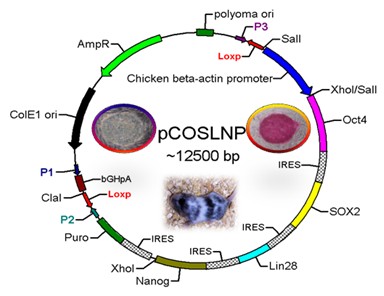 | Tongbiao ZHAO, Ph. D. stem cell and immunology
Co-workers: Jiani Cao, Xiaoyan Li, Qian Zhao, Kun Liu, Linyuan Jin, Haoyu Xu, Xing Li, Weiyun Cao, Chenxi Cheng, Ling Wang, Yingjie Zhu, Xingxing Shi, Yu Zhao, Lin Zhang, Yuchang Tian, Shiyu Li, Ning Sui, Zheng Li, Xiahua Chai
· ZHAO Group website | | | | | | Embryonic stem cells (ESCs) can undergo unlimited self-renewal and retain the pluripotency to differentiate into all cell types in the body. Therefore, human ESCs hold great promise for cell replacement therapy. However, one major obstacle is that the cells derived from human ESCs have allogeneic antigens when transplanted into the patients, leading to immune rejection even under chronic immune suppression that itself poses serious risk for cancer and infection. Induced pluripotent stem cells (iPSCs), reprogrammed from somatic cells with defined factors, hold great promise for regenerative medicine as the renewable source of autologous cells. Whereas it has been generally assumed that these autologous cells should be immune-tolerated by the recipient from whom the iPSCs are derived, our recent work showed that cells derived from iPSCs can trigger immune rejection response. The findings suggest appropriate immune tolerance induction should be reconsidered for clinic development of pluripotent stem cells. Like development, somatic cell reprogramming is an epigenomic reconstruction process. How does the transcription factors orchestrate the process is one of the most critical open questions. Our long-term goal is to understand the epigenetic mechanisms of reprogramming and differentiation. 
An episomal approach to generate mouse and human iPSCs
| Plain english:
Our research interests mainly focus on stem cells and immunology including: 1) Understanding the immunogenicity of induced pluripotent stem cells; 2) Developing new tolerance strategies to derivatives of stem cells; 3) Dissecting the epigenetic mechanisms of reprogramming. Selected publications: - Zhou J#, Jin L, Wang F, Zhang Y, Liu B, Zhao T*. Chimeric antigen receptor T (CAR-T) cells expanded with IL-7/IL-15 mediate superior antitumor effects. Protein Cell. 2019,10(10):764-769.
- Gu H#, Shi X#, Liu C#, Wang W#, Shi N, Zhao Y, Gong J, Wang F, Zhang H, Li W*, Zhao T*. USP8 maintains embryonic stem cell stemness via deubiquitination of EPG5. Nature Communications, 2019, 10(1):1465.
- Wang L#, Ye X#, Zhao T*. The physiological roles of autophagy in the mammalian life cycle. Biological Reviews, 2019, 94(2): 503-516.
- Gong J#, Gu H#, Zhao L#, Wang L, Liu P, Wang F, Xu H, Zhao T*. Phosphorylation of ulk1 by ampk is essential for mouse embryonic stem cell self-renewal and pluripotency. Cell Death & Disease, 2018, 9(2): 38.
- Liu P#, Liu K#, Gu H, Wang W, Gong J, Zhu Y, Zhao Q, Cao J, Han C, Gao F, Chen Q, Li W, Jiao J, Hu B, Zhou Q, Zhao T*. High autophagic flux guards ESC identity through coordinating autophagy machinery gene program by FOXO1. Cell Death and Differentiation, 2017, 24(10): 1672-1680.
- Sun H#, Cao J#, Zhao L#, Zhu S, Chen S, Li Y, Zhao B, Zhao T*. PIM2 regulates stemness through phosphorylation of 4E-BP1. Science Bulletin, 2017, 62(10): 679-685. (Cover story).
- Liu K#, Zhao Q#, Liu P#, Cao J, Gong J, Wang C, Wang W, Li X, Sun H, Zhang C, Li Y, Jiang M, Zhu S, Sun Q, Jiao J, Hu B, Zhao X, Li W, Chen Q, Zhou Q*, Zhao T*. ATG3-dependent autophagy mediates mitochondrial homeostasis in pluripotency acquirement and maintenance. Autophagy, 2016, 12(11): 2000-2008.
- Zhu S, Cao J, Sun H, Liu K, Li Y, Zhao T*. p18 inhibits reprogramming through inactivation of Cdk4/6. Scientific Reports, 2016, 6: 31085.
- Zhang C, Cao J, Li X, Xu H, Wang W, Wang L, Zhao X, Li W, Jiao J, Hu B, Zhou Q*, Zhao T*. Treatment of multiple sclerosis by transplantation of neural stem cells derived from induced pluripotent stem cells. Science China Life Sciences, 2016, 59(9): 950-957.
- Zhao T#, Zhang Z#, Westenskow P#, Todorova D, Hu Z, Lin T, Rong Z, Kim J, He J, Wang M, Clegg D, Yang Y, Zhang K, Friedlander M, Xu Y*. Humanized mice reveal differential immunogenicity of cells derived from autologous induced pluripotent stem cells. Cell Stem Cell, 2015, 17(3): 353-359.
- Wang L#, Cao J#, Wang Y#, Lan T#, Liu L, Wang W, Jin N, Gong J, Zhang C, Teng F, Yan G, Li C, Li J, Wan H, Hu B, Li W, Zhao X, Qi Z*, Zhao T*, Zhou Q*. Immunogenicity and functional evaluation of iPSC-derived organs for transplantation. Cell Discovery, 2015, 1: 15015.
- Zhao T, Zhang Z, Rong Z, Xu Y*. Immunogenicity of induced pluripotent stem cells. Nature, 2011, 474(7350): 212-216.

| |

